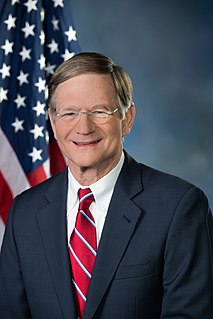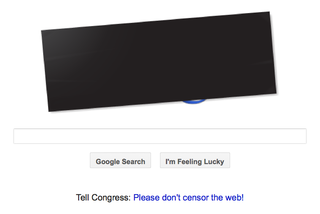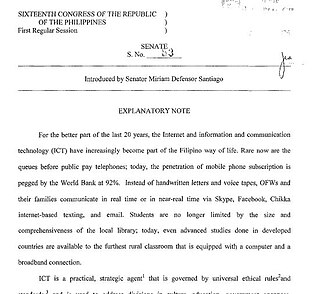
Lamar Seeligson Smith is an American politician and lobbyist who served in the United States House of Representatives for Texas's 21st congressional district for 16 terms, a district including most of the wealthier sections of San Antonio and Austin, as well as some of the Texas Hill Country. He is a member of the Republican Party. He sponsored the Stop Online Piracy Act (SOPA) and the Protecting Children From Internet Pornographers Act (PCIP). He also co-sponsored the Leahy–Smith America Invents Act.
Internet censorship in the United States is the suppression of information published or viewed on the Internet in the United States. The First Amendment of the United States Constitution protects freedom of speech and expression against federal, state, and local government censorship.
The Prioritizing Resources and Organization for Intellectual Property Act of 2008 is a United States law that increases both civil and criminal penalties for trademark, patent and copyright infringement. The law also establishes a new executive branch office, the Office of the United States Intellectual Property Enforcement Representative (USIPER).

The Anti-Counterfeiting Trade Agreement (ACTA) is a multilateral treaty for the purpose of establishing international standards for intellectual property rights enforcement that did not enter into force. The agreement aims to establish an international legal framework for targeting counterfeit goods, generic medicines and copyright infringement on the Internet, and would create a new governing body outside existing forums, such as the World Trade Organization, the World Intellectual Property Organization, and the United Nations.

Copyright infringement is the use of works protected by copyright without permission for a usage where such permission is required, thereby infringing certain exclusive rights granted to the copyright holder, such as the right to reproduce, distribute, display or perform the protected work, or to make derivative works. The copyright holder is typically the work's creator, or a publisher or other business to whom copyright has been assigned. Copyright holders routinely invoke legal and technological measures to prevent and penalize copyright infringement.

United States Senate Bill S.3804, known as the Combating Online Infringement and Counterfeits Act (COICA) was a bill introduced by Senator Patrick Leahy (D-VT) on September 20, 2010. It proposed amendments to Chapter 113 of Title 18 of the United States Code that would authorize the Attorney General to bring an in rem action against any domain name found "dedicated to infringing activities", as defined within the text of the bill. Upon bringing such an action, and obtaining an order for relief, the registrar of, or registry affiliated with, the infringing domain would be compelled to "suspend operation of and lock the domain name."
Music piracy is the copying and distributing of recordings of a piece of music for which the rights owners did not give consent. In the contemporary legal environment, it is a form of copyright infringement, which may be either a civil wrong or a crime depending on jurisdiction. The late 20th and early 21st centuries saw much controversy over the ethics of redistributing media content, how much production and distribution companies in the media were losing, and the very scope of what ought to be considered piracy – and cases involving the piracy of music were among the most frequently discussed in the debate.

The PROTECT IP Act was a proposed law with the stated goal of giving the US government and copyright holders additional tools to curb access to "rogue websites dedicated to the sale of infringing or counterfeit goods", especially those registered outside the U.S. The bill was introduced on May 12, 2011, by Senator Patrick Leahy (D-Vt.) and 11 bipartisan co-sponsors. The Congressional Budget Office estimated that implementation of the bill would cost the federal government $47 million through 2016, to cover enforcement costs and the hiring and training of 22 new special agents and 26 support staff. The Senate Judiciary Committee passed the bill, but Senator Ron Wyden (D-Ore.) placed a hold on it.
The Protecting Children from Internet Pornographers Act of 2011 was a United States bill designed with the stated intention of increasing enforcement of laws related to the prosecution of child pornography and child sexual exploitation offenses. Representative Lamar Smith (R-Texas), sponsor of H.R. 1981, stated that, "When investigators develop leads that might result in saving a child or apprehending a pedophile, their efforts should not be frustrated because vital records were destroyed simply because there was no requirement to retain them."

The Stop Online Piracy Act (SOPA) was a controversial proposed United States congressional bill to expand the ability of U.S. law enforcement to combat online copyright infringement and online trafficking in counterfeit goods. Introduced on October 26, 2011 by Representative Lamar Smith (R-TX), provisions included the requesting of court orders to bar advertising networks and payment facilities from conducting business with infringing websites, and web search engines from linking to the websites, and court orders requiring Internet service providers to block access to the websites. The proposed law would have expanded existing criminal laws to include unauthorized streaming of copyrighted content, imposing a maximum penalty of five years in prison.

The Online Protection and Enforcement of Digital Trade Act is a bill introduced in the United States Congress proposed as an alternative to the Stop Online Piracy Act and PROTECT IP Act, by Senator Ron Wyden of Oregon, a Democrat, and Representative Darrell Issa of California, a Republican. The text of the bill is available for public comment at keepthewebopen.com.
There were different but similar copyright bills in the 112th United States Congress: The Stop Online Piracy Act (SOPA) in the House of Representatives and the PROTECT IP Act (PIPA) in the Senate. A typical route for legislation like this is to pass some version in both houses, then refer the two bills to a conference committee, which would produce a single bill likely to pass both houses.

On January 18, 2012, a series of coordinated protests occurred against two proposed laws in the United States Congress—the Stop Online Piracy Act (SOPA) and the PROTECT IP Act (PIPA). These followed smaller protests in late 2011. Protests were based on concerns that the bills, intended to provide more robust responses to copyright infringement arising outside the United States, contained measures that could possibly infringe online freedom of speech, websites, and Internet communities. Protesters also argued that there were insufficient safeguards in place to protect sites based upon user-generated content.

The Cyber Intelligence Sharing and Protection Act was a proposed law in the United States which would allow for the sharing of Internet traffic information between the U.S. government and technology and manufacturing companies. The stated aim of the bill is to help the U.S. government investigate cyber threats and ensure the security of networks against cyberattacks.
Demand Progress is an internet activist-related entity encompassing a 501(c)4 arm sponsored by the Sixteen Thirty Fund and a 501(c)3 arm sponsored by the New Venture Fund. It specializes in online-intensive and other grassroots activism to support Internet freedom, civil liberties, transparency, and human rights, and in opposition to censorship and corporate control of government. The organization was founded through a petition in opposition to the Combating Online Infringement and Counterfeits Act, sparking the movement that eventually defeated COICA's successor bills, the Stop Online Piracy Act and the PROTECT IP Act, two highly controversial pieces of United States legislation.

The Magna Carta for Philippine Internet Freedom is an internet law bill filed in the Congress of the Philippines. The bill contains provisions promoting civil and political rights and Constitutional guarantees for Philippine internet users, such as freedom of expression, as well as provisions on information and communications technology (ICT) policy, ICT4D, internet governance, e-governance, cybersecurity, cyberwarfare, cyberterrorism, and cybercrime.

The Copyright Alternative in Small-Claims Enforcement Act of 2020 is a United States law that establishes a small claims court-type system within the United States Copyright Office, known as the Copyright Claims Board, for copyright owners to seek damages under US$30,000 for copyright violations.

The Protecting Lawful Streaming Act of 2020 is a United States law that makes it a felony to engage in large-scale streaming of copyright material. The bill was introduced by Senator Thom Tillis on December 10, 2020. The bill was added to the omnibus Consolidated Appropriations Act, 2021 (CAA), and is located in Division Q, Title II, § 211 of the CAA. The CAA passed the house and the senate on December 21, 2020, and was signed into law by President Donald Trump on December 27, 2020.






